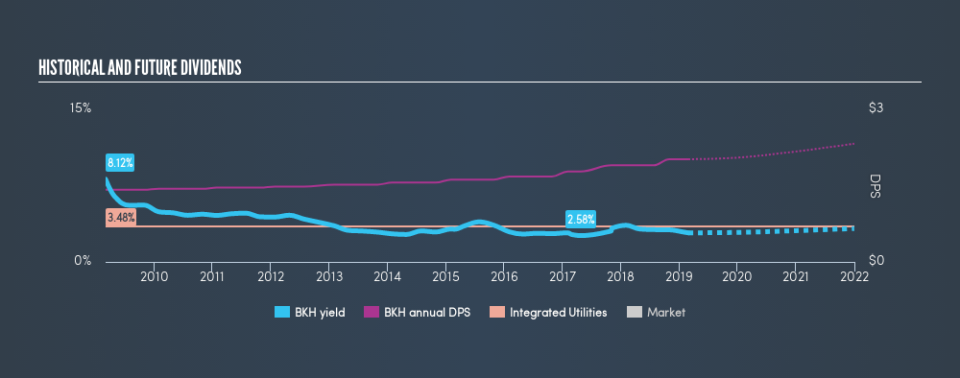Black Hills Corporation (NYSE:BKH) Is An Attractive Dividend Stock, Here’s Why

There is a lot to be liked about Black Hills Corporation (NYSE:BKH) as an income stock. It has paid dividends over the past 10 years. The company is currently worth US$4.2b, and now yields roughly 2.9%. Does Black Hills tick all the boxes of a great dividend stock? Below, I’ll take you through my analysis.
View our latest analysis for Black Hills
5 questions to ask before buying a dividend stock
When researching a dividend stock, I always follow the following screening criteria:
Is it paying an annual yield above 75% of dividend payers?
Has its dividend been stable over the past (i.e. no missed payments or significant payout cuts)?
Has it increased its dividend per share amount over the past?
Is its earnings sufficient to payout dividend at the current rate?
Will it be able to continue to payout at the current rate in the future?
How well does Black Hills fit our criteria?
The company currently pays out 40% of its earnings as a dividend, according to its trailing twelve-month data, which means that the dividend is covered by earnings. Going forward, analysts expect BKH’s payout to increase to 60% of its earnings. Assuming a constant share price, this equates to a dividend yield of 3.0%. However, EPS is forecasted to fall to $3.42 in the upcoming year. Therefore, although payout is expected to increase, the fall in earnings may not equate to higher dividend income.
When thinking about whether a dividend is sustainable, another factor to consider is the cash flow. A company with strong cash flow, relative to earnings, can sometimes sustain a high pay out ratio.
Reliablity is an important factor for dividend stocks, particularly for income investors who want a strong track record of payment and a positive outlook for future payout. In the case of BKH it has increased its DPS from $1.42 to $2.02 in the past 10 years. During this period it has not missed a payment, as one would expect for a company increasing its dividend. These are all positive signs of a great, reliable dividend stock.
In terms of its peers, Black Hills has a yield of 2.9%, which is on the low-side for Integrated Utilities stocks.
Next Steps:
Keeping in mind the dividend characteristics above, Black Hills is definitely worth considering for investors looking to build a dedicated income portfolio. Given that this is purely a dividend analysis, I urge potential investors to try and get a good understanding of the underlying business and its fundamentals before deciding on an investment. There are three important factors you should further research:
Future Outlook: What are well-informed industry analysts predicting for BKH’s future growth? Take a look at our free research report of analyst consensus for BKH’s outlook.
Historical Performance: What has BKH’s returns been like over the past? Go into more detail in the past track record analysis and take a look at the free visual representations of our analysis for more clarity.
Other Dividend Rockstars: Are there better dividend payers with stronger fundamentals out there? Check out our free list of these great stocks here.
We aim to bring you long-term focused research analysis driven by fundamental data. Note that our analysis may not factor in the latest price-sensitive company announcements or qualitative material.
If you spot an error that warrants correction, please contact the editor at editorial-team@simplywallst.com. This article by Simply Wall St is general in nature. It does not constitute a recommendation to buy or sell any stock, and does not take account of your objectives, or your financial situation. Simply Wall St has no position in the stocks mentioned. Thank you for reading.

